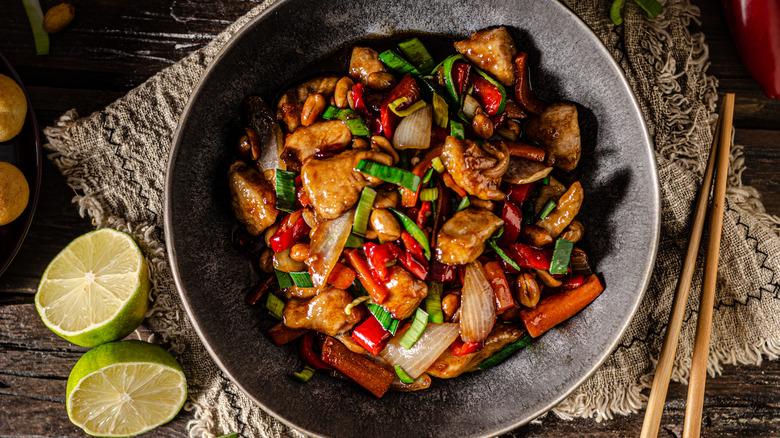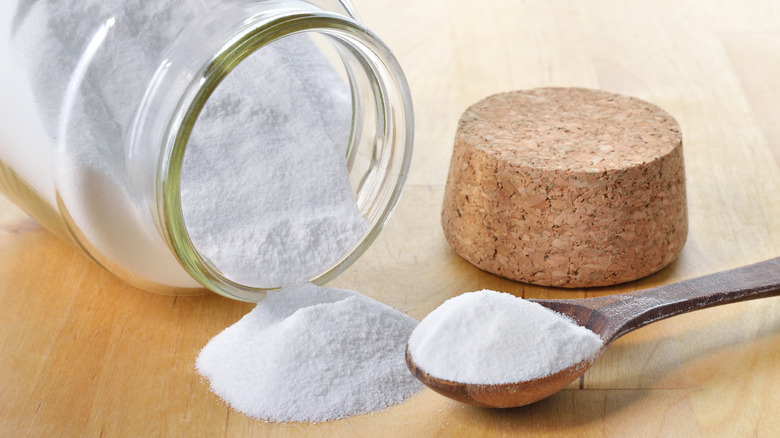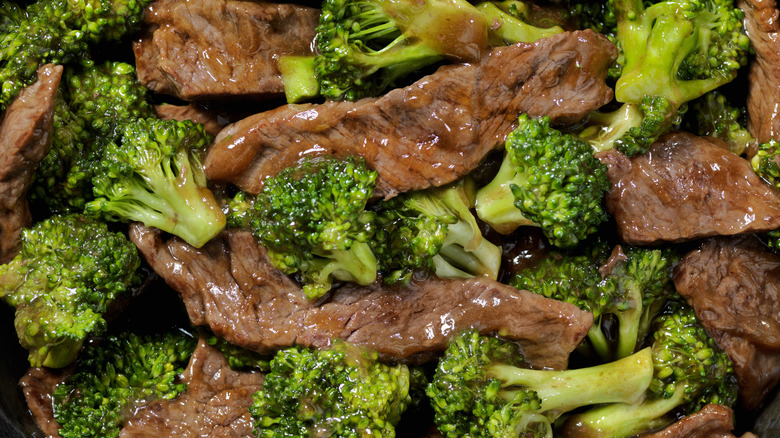Baking Soda Is The Ingredient Your Stir-Fry Is Missing
There is something irreplaceably delicious about take-out stir-fry — smoke-kissed vegetables, umami-heavy sauce, and bite-sized pieces of meat that are tender, slick, and addictive. If you have ever tried to recreate this sort of dish at home, you may have nailed the crisp vegetables and sweet and salty sauce, but the protein was probably a little dryer and tougher than what you would expect from a restaurant — even if you felt like you did everything right!
The mystery is solved. With a Chinese method called velveting, you can replicate the technique that makes moo goo gai pan superior to your standard stir-fry. Create a super tender texture by marinating meat in baking soda.
About a teaspoon per pound of meat and a half-hour marination time should do the trick. Cut your meat very thinly and against the grain — slice beef while it is still frozen for more ease. Then, stir in the baking soda. After it marinates for about 30 minutes, give it a good rinse to remove any excess baking soda, and thoroughly dry everything. Your meat of choice is now ready to stir-fry in a searing hot wok.
There are also other recipes that harness the power of baking soda without technically velveting. Those preparations use a smaller amount of baking soda in a marinade alongside ingredients like soy sauce, sesame oil, Shaoxing wine, monosodium glutamate, and cornstarch. In these cases, the baking soda does not have to be rinsed off.
Why a baking soda marinade makes meat more tender
An alkaline environment — which you are creating with baking soda — has a profound effect on tenderization. Something that has high alkalinity neutralizes acid, and baking soda is very basic — meaning it is not acidic at all. When it comes in contact with meat, it increases the pH level on the outer layers. Typically, protein stands in meat seize up when they are cooked at high heat. That tension translates as toughness when you eat it. However, the basic nature of baking soda makes it more difficult for protein strands to bind together, which results in a much more tender final product.
Be aware that the more tender the raw protein and the thinner the cut, the less time it will need to marinate. Go for the full half hour for beef, lamb, or pork, but chicken and fish may need a bit less time. Also, a baking soda marinade can definitely head into 'too much of a good thing' territory. If you let the meat marinate past the recommended amount of time, it can become mushy, mealy, and wholly unappetizing.
Other recipes use a combination of cornstarch and egg whites for velveting. The cornstarch helps to lock in the natural moisture of the meat while the alkaline egg whites act similarly to the baking soda.
Washing the meat is optional, but suggested
Before the baking soda marinade, you have the option to wash the meat. If you do so carefully and properly sanitize all your surfaces afterward, it is worth it for the texture. If executed haphazardly, washing meat does increase the likelihood of cross-contamination across the surfaces in your kitchen, per the USDA. However, this is a tried-and-true tenderization method for Chinese cooks.
If you decide to give it a try, transfer your protein to a bowl, give the pieces a good rinse, and massage them vigorously in cold water. Then, place the washed meat in a fine mesh sieve, and press out as much of the water as possible. Washing your protein and then squeezing it aggressively improves the texture by helping to break down the muscle fibers — kind of like the carnivorous version of massaging kale. In places with hard water, the alkalinity levels could also help soften the protein, just like baking soda and egg whites do. For extra tender results, try out the washing method in a Hunan-style beef stir-fry recipe, which also utilizes a baking soda marinade.



